Russian Propaganda in Macedonia in 2018: “United Macedonia” as a “Pawn” of “United Russia”
The recent expulsion of five Russian diplomats is not the first expulsion of Russian diplomats from Macedonia. For the first time, Macedonia expelled a Russian diplomat in 2018, when not only the intensified Russian propaganda influence was noticeable, but also an attempt for Russian political influence by supporting the Macedonian clone of “United Russia”
Author: Žarko Trajanoski, media analyst
Russian influence in Macedonia is not only through the “Russian salad”
Even before the beginning of 2018, the Russian Embassy in Macedonia tried to joke about “increasing Russian influence” by publishing a photo of the “Russian salad”, which is mostly consumed during the New Year holidays. But on the subject of “Russian influence” and the “Ukrainian scenario”, the devil had long done its job (see analyses 1 and 2). As in the past few years, in December 2017, Russian propagandists published gloomy predictions for Macedonia to disappear from the world map and for the division of Macedonia between Albania and Bulgaria (See ANNEY KORIBKO’S ANALYSIS: Will Macedonia disappear from the world map in 2018?). Local Russian spokesmen, meanwhile, spread apocalyptic predictions that “Macedonia has been chosen as the place where the next war will start, i.e. the world conflict between NATO and Russia.”
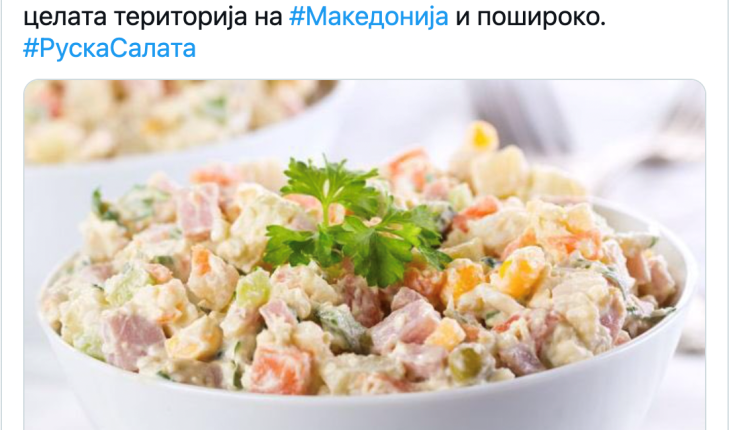
One month after the prediction of an avant-garde “third force” in Macedonia, which would fight for its protection from destruction, such a candidate appeared on the political scene. It was the “United Macedonia” party, which openly advocated an alliance with Russia and waged a black campaign against NATO and the EU.
“United Macedonia” against the “fascism” of NATO and the EU
Immediately after the renaming, representatives of “United Macedonia” declared NATO and the EU fascist institutions. The leader of the party with a new pro-Russian identity branded NATO not only as “fascist” but also as “a genocidal organization for Macedonians with the attempt to change our centuries-old name and identity”. In January 2018, “United Macedonia” suggested that the highway to Greece be called genocide instead of friendship and asked the government to withdraw its application for EU membership, in line with its strategic goal of membership in the Eurasian Economic Union and strategic partnership with Russia. Also, “United Macedonia” announced that the procedure in the Parliament against Macedonia’s membership in NATO has started, which ensures the “survival of Macedonia and the Macedonians”.
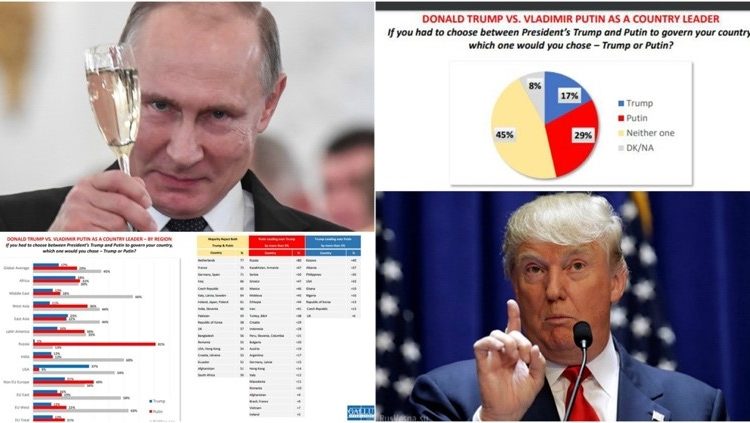
While the media spread rumors that Macedonians prefer the Russian president as their leader, Russian Ambassador Shcherbak claimed that Russia neither interfered nor will ever interfere in the internal affairs of Macedonia. While Lavrov warned that NATO expansion with Macedonia was a mistake, the leader of United Macedonia was trying to mobilize politically with disinformation anti-Albanian messages and messages against the “fascist demand for a change of name and identity for membership in the Union”.
Bačev also published two open letters. The first letter was addressed to the President of the EC, in which he sent a message that Macedonia “does not see its future in the EU and NATO and does not share your liberal values contrary to natural laws.” The second letter was addressed to Putin, in which Bačev congratulated him on his victory, thanking him for Russia’s support and expressing confidence that in his term “the Republic of Macedonia will gain a historic strategic alliance with Russia and membership in the Eurasian Economic Union”.
Russia’s propaganda offensive against NATO and the EU
In February and March 2018 it was already visible that pro-Russian propaganda in Macedonia was on a political “offensive”. For example, in the then most-watched show “Samo vistina” on February 20, 2018, two pro-Russian propagandists “debated” the topic “Is there an alternative for Macedonia except for EU and NATO?”. The guests were the only ones to wage a negative campaign against the EU and NATO, denigrate the pro-Western government and ridicule the supporters of joining NATO and the EU. In the same show, the representative of “United Macedonia” sent explicit anti-Albanian messages that Albanians “will have two options – either to start learning Russian or to learn to swim, and I say that very seriously.” The leader of “United Macedonia” Bačev was a guest in the same debate show in early March 2018, when he claimed that “the strategic alliance with Russia ensures the survival and future of Macedonia”. The guest of “Samo vistina” in March was the columnist, Professor Biljana Vankovska, as the first signatory of the manipulative proclamation of intellectuals who demanded the termination of the name negotiations. Vankovska, author of the column Nobel Prize for Putin: And why not? (in “Ruska Reč”), previously promoted the slogan “NO to NATO, even under a constitutional name!”.
Despite attempts to intimidate with “brutal Albanianization”, “United Macedonia” constantly played the “anti-fascist” card, presenting the “West” as fascist. Thus, at the propaganda session at which the honorary speaker was the Russian propagandist and geopolitician Alexander Dugin, the spokesman of “United Macedonia”, Vlahov Micov, spread disinformation about the number of Albanians in Macedonia (“13.6% minority”), who aimed to destroy the Slavic world: “Currently, the United States, NATO and the EU constitute the fourth fascist Reich, whose predecessor is the third Hitler Reich…… the goal of these new Hitlers is the complete destruction of the Slavic world led by Russia..”
“United Macedonia” and Dugin offered the Macedonian public not only negative propaganda towards the West and liberalism but also a political alternative in the Eurasian Union and the “Slavic Brotherhood” (see: The Propagandist Dugin, the Satanization of the West and the Apology of Russian Imperialism).
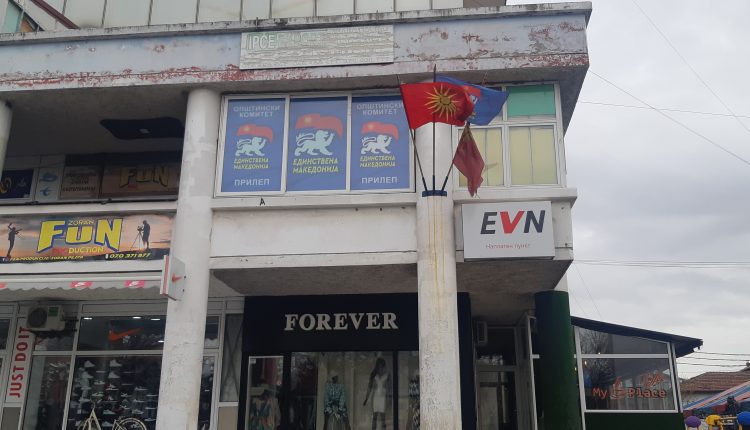
The propaganda offensive continued after Putin’s election victory when Mirka Velinovska in her column “Russia Changes the World” denigrated the “Euro-Atlantic Western political-elitist nomenclature” as a “vulgar, vandal tribe” and “a collection of savages in Brussels“. Velinovska described the Macedonian prime minister as “the most vulgar example, but also a living proof of the value paradigm of the vandalized uncivilized West” and accused the “Euro-Atlantic broilers” of allying “with the fascist Euro-American militant conspiracy against Russia”.
Russia’s official spokesmen have not spared slander against NATO. Lavrov’s message that “NATO enlargement with Macedonia is a mistake” was followed by a statement by the Russian Foreign Ministry that “plans to bring the Republic of Macedonia into NATO could have negative consequences for regional security and bilateral relations.” Russian Ambassador Shcherbak joined the chase against NATO with the message that “NATO is not a school for peacekeepers, but an aggressive military-political bloc guilty of many military interventions.”
After Macedonia expelled a Russian diplomat on March 26, 2018, due to the “Skripal case” and crossing the red line, Moscow reacted sharply, warning that “the responsibility for the consequences of this move will be fully borne by the Macedonian side.”
The Russian ambassador first stated in a column that “Macedonia was part of the countries that give in to this Anglo-Saxon psychosis and to the detriment of the interests of their country make hasty decisions that complicate relations with Russia.” Then, at a press conference, Shcherbak issued a threatening warning that “Macedonia will be a legitimate target of Russia in case of conflict with NATO,” at which Prime Minister Zaev commented that Macedonia does not want quarrels with Moscow.
The “United Macedonia” party condemned the expulsion of the Russian diplomat and called a rally in front of the Russian embassy, where they told the Russian ambassador that the Macedonian people want to be part of the Eurasian Union and that EU access wished only “corrupt Macedonians who are paid with foreign money “.
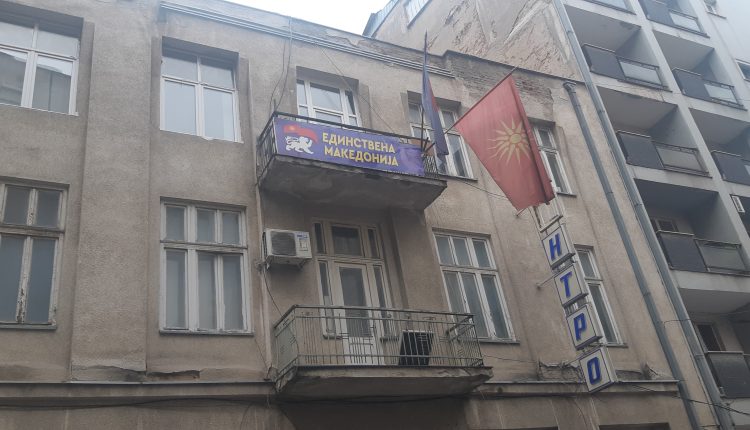
Russian propaganda before the Prespa Agreement: An attempt to use the name dispute
Just before the launch of the Macedonian version of “United Russia”, the statement of the Russian Minister of Foreign Affairs Sergey Lavrov on January 15, 2018, regarding the possible solution to the “name dispute” caused real media waves. After several media reported that Russia will accept any name change (Lavrov: We will accept the name that will be agreed between Athens and Skopje/Lavrov: We will accept any new name of Macedonia/“Russia on the side of Greece wants Macedonia to change the name “), the Russian embassy warned in a tweet that the Macedonian media manipulated, that is, spread a false interpretation of Lavrov’s words (a transcript of Lavrov’s statement was also published). However, some of the concerned media correctly pointed out that what was reported by Lavrov in the Macedonian media was in fact a quote from the Russian site “Russia Today”, where the following short news was published during Lavrov’s press conference: “On the name dispute between Greece and Macedonia, Lavrov says Russia would abide by any decision made in the Macedonian constitution, should that happen “(RТ). Later, the Russian Ambassador Shcherbak, at the promotion of the exhibition “Moscow Today” (February 28, 2018), stressed that “Greece and Macedonia have the right to a solution that suits both sides.”
However, after Lavrov’s controversial statements and political interpretations of the emergence of a “third force”, the marginal party “People’s Movement for Macedonia” decided to rename itself “United Macedonia” and to oppose NATO and EU membership, and declare itself an alliance with Russia and membership in the Eurasian Union. “United Macedonia” and other pro-Russian spokesmen stressed the need to preserve the constitutional name at all costs, which can be interpreted as an indication that Russia is still trying to use the name dispute to achieve its strategic goals in Macedonia and the Balkans. The support of Savin and Dugin for the preservation of the name was interpreted in that direction, a visit that some analysts interpreted as a “hybrid act”.
Following the expulsion of the Russian diplomat in March, the Russian embassy tweeted in response to a statement by VMRO-DPMNE Vice President Aleksandar Nikolovski where he said that “Macedonia must be a member of the EU and NATO” and that “Our partner is not Moscow, our partners are Brussels, London and Washington”:
According to Aleksandar Nikolovski, Moscow was not a partner for VMRO-DPMNE. Remarkable attitude.
Според @AlexandarMKD #Москва не била партнер за @VMRO_DPMNE – за разлика од Лондон, Брисел и Вашингтон. Забележителен став https://t.co/PezPdTKQdY
— Посольство России МК (@Russian_Emb_MKD) March 28, 2018
Russian Ambassador Shcherbak also interpreted the statement as a reflection of the “inconsistent policy of part of the VMRO-DPMNE leadership”, which “led to VMRO-DPMNE losing power.” Contrary to the statement “our partner is not Moscow”, Shcherbak indicated that he knew many of Nikoloski’s party members who were “in the mood to develop constructive and partnership relations with Russia”.
Due to the statement “our partner is not Moscow”, VMRO-DPMNE and its leader were the target of slander by Russian propagandists in Macedonia, who announced the “disintegration of VMRO-DPMNE”. The Macedonian clone of “United Russia” also targeted “bandits from VMRO-DPMNE and SDSM”, calling for early elections for the people to decide “whether it is for NATO and the EU or for Russia and the EEU.”
While the Russian ambassador suggested status of military neutrality and showed concern for the Macedonians with the message “We do not want NATO to use the Macedonians as cannon fodder”, the leader of “United Macedonia” sent anti-Albanian messages. Bačev demanded the revocation of the recognition of Kosovo, urging the foreign minister “to start learning Russian together with his Albanian compatriots, and for radical Albanians to learn to swim.”
Contrary to the claims of the Russian ambassador (Shcherbak: Allegations that Russia is interfering in the name dispute are propaganda lies), the leader of the Macedonian clone of “United Russia” tried to make the most of the name dispute for his own promotion and party mobilization. Bačev even tried to send a letter to the Greek Embassy to Tsipras with a message that “the Macedonian people and most of the citizens of the Republic of Macedonia do not stand behind any agreement between the Republic of Macedonia and the Hellenic Republic to change the Macedonian name and identity.” Also in the letter, Bačev stressed that “we do not see our future in the EU and NATO, but in a strategic alliance with Russia and membership in the Eurasian Economic Union.” “United Macedonia” was trying to promote itself as the only party against the name change, which was clear from the video posted on their Facebook page entitled: “Mickovski and Zaev are for the name change”.
The same month when the Russian ambassador claimed in a column that Russia was being accused without evidence of “alleged attempts to destabilize Macedonia” and that it was doing everything “to prevent the country’s NATO integration”, the leader of “United Macedonia” boasted that not only who was on a party visit to Russia, but also that as a party they successfully passed the Russian training. Speaking on Star TV, Bačev said that he had met in the State Duma of Russia, with the leaders of the Eurasian movement Dugin and Savin, but also with representatives of “our close party United Russia”.
Thanks to “Russian training” by Dugin’s aide, Bacev claimed that they would defeat the “disastrous policies of the ‘Funeral for Macedonia’ party composed of SDSM and VMRO-DPMNE” and that they were ready to take power and clear up with all “National traitors”. The “trainer” Leonid Savin from Russia prophetically confirmed that “the new government that will be in United Macedonia should maintain the unity of the country”.
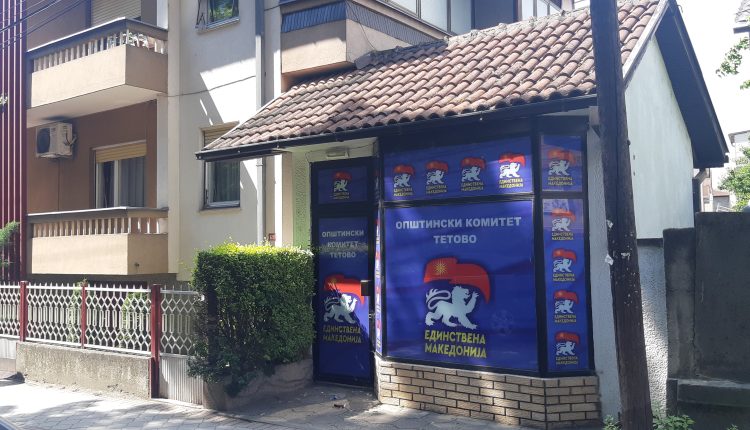
Russian propaganda after the Prespa Agreement: Attempts to destabilize
In June 2018, the “trained” Bačev began to discredit the negotiations with Greece as “the private party of Zaev and Tsipras for a name change agreement” and predicted that “Neither the name change will take place nor Macedonia will become a member of NATO.”
After it became clear on June 12, 2018, that an agreement would be signed with Greece, the fan group “Komiti”, of the sports club “Vardar” owned by Sergey Samsonenko – Honorary Consul of the Russian Federation, called for a mass protest and sent a threatening message to all involved in changing “our age-old name“: “we will come after you and your family!”, reads the post of “Komiti”, who published a photo with the slogan “damn the traitors who betrayed their own people”.
The “Komiti” in their political “communique” claimed that the country was “fiercely attacked by internal foreign aggressors, who want to change identity, nation, language, history by force and genocidal methods … “and called for a revolution.
At the same time, Russian Foreign Minister Lavrov expressed hope that “the agreement has broad popular support”, that is, that it will be supported by Russia “if the name agreement is supported by the citizens of both countries”. The Vice President of VMRO-DPMNE and some media interpreted that “Lavrov supported the agreement” and “welcomed the renaming of North Macedonia”, i.e. that the support of “brotherly” Russia for the name was stopped (So much was the “support” of “brotherly” Russia for the name – Lavrov in the company of Kozijas welcomed the agreement).
However, the Russian embassy clarified in a tweet that
Unfortunately, some media outlets continue to spread tendentious interpretations and false news about Russia’s views on the name issue of the Republic of Macedonia.
A prominent Russian propagandist the next day even personally targeted the VMRO-DPMNE vice president as a “liar and spinner”.
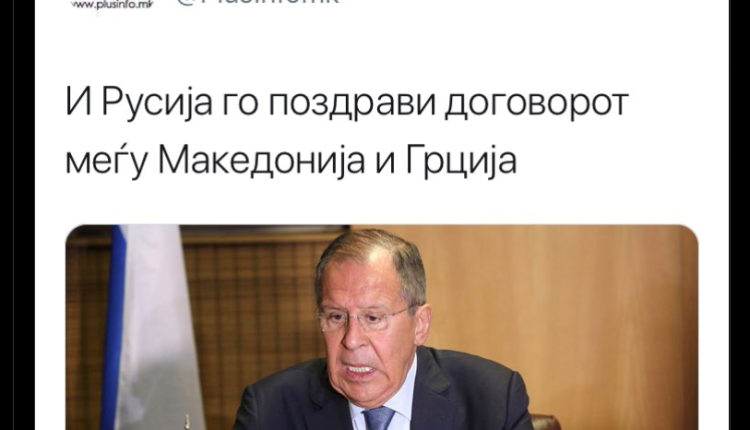
On a TV appearance, Bačev claimed that “It was a big lie that Lavrov agreed to the name change” and that “that spin was made by those Soros media in the country” (although the most explicit interpretation is that “Lavrov supported the agreement” was from the vice president of VMRO-DPMNE). And then Bačev placed SDSM and VMRO-DPMNE in the same opposite camp as pro-NATO parties: “On one side are VMRO-DPMNE and SDSM, which say” NATO and the EU have no alternative “, on the other side we say strategic alliance with Russia”. In the same TV show, hosted by a well-known pro-Russian spokesman, the other guest, Alexander Stankovski, promoted the Eurasian orientation as an ideology and satanized the West and liberalism, citing Dugin:
… what Dugin calls the fourth way, the fourth ideological or political theory. So liberalism, which has lasted for 200 years, is ready, it does not give results, it gives degeneration, it gives problems, it creates unnecessary wars in the world, it creates domination that is SATAN.
A day before the signing of the Prespa Agreement, “United Macedonia” declared it a “national betrayal and a grave crime against the Macedonian people”, and announced that “the new legal government of United Macedonia will immediately annul such an agreement.” On the day of the signing of the agreement, “United Macedonia” supported the “Komiti”, who called for a mass protest, again threatening: “we are the Komiti and we will find you, and you have read the rest in the history textbooks.” The radical group “Tvrdokorni” made themselves available to President Ivanov “in defence of our homeland”, who previously called the agreement with Greece “harmful” and announced that he would not sign it.
At the protest in front of the Parliament on June 17, 2018, which was full of hate speech and explicit threats of violence, “Komiti” broke the police cordon, and the leader of “United Macedonia”, Bačev with a Russian flag climbed on a police car. The Ministry of Interior said that “some of the protesters used explosives and forcibly pushed the protective fence, trying to force their way into the Parliament”, and the government sent a message that “a replay of April 27 will not be allowed“. Later, information was made public by the Prime Minister that the rioters had been paid by Greek businessmen, and that Russian officials had encouraged the protests and the violence. Investigative journalists established incriminating relations between the Russian businessman, the United Russia party, the Komiti fan group, and the owner of the Vardar Football Club (Honorary Consul of Russia).
After the leader of “United Macedonia” waved the Russian flag during the violent protests in front of the Parliament, he was propagandistically targeted as a “Trojan horse” and installation of SDSM by media close to VMRO-DPMNE. Bacev’s party reacts sharply against “journalistic janissaries and mercenaries, formerly Gruevski, now Mickoski.”
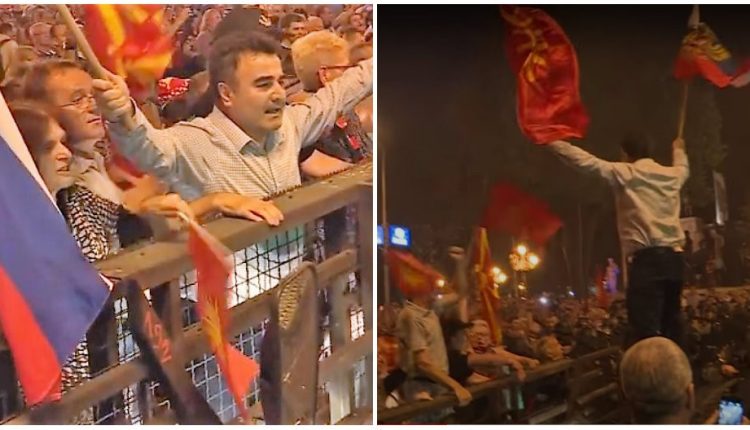
In a speech in front of Parliament on May 18, 2018, Bačev disparaged the Prespa Agreement as a “private party”, similar to pro-Russian propagandist Milenko Nedelkovski, who called it a “private party of the Greek and Macedonian prime ministers”. Bačev then assured the protesting groups that “there is no international agreement” and that “Macedonia will neither become a NATO member nor change its name”.
However, the reality is denied by the university professor of international law at the Faculty of Law at the International Slavic University “Gavrilo Romanovich Derzhavin”. In the continuation of the analysis we will see how exactly thanks to the Prespa Agreement, Macedonia became a member of NATO after the change of the constitutional name, despite the increased Russian influence during the referendum and the process of constitutional changes.
All comments and remarks regarding this and other Vistinomer articles, correction and clarification requests as well as suggestions for fact-checking politicians’ statements and political parties’ promises can be submitted by using this form
